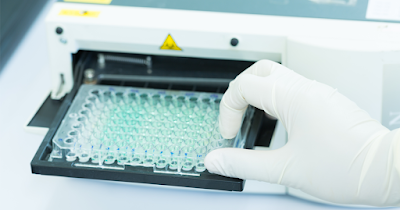Microplate readers, also known as microplate photometers, are laboratory instruments used to detect chemical or physical changes in microtiter plates. In biotechnological and pharmaceutical industries, quality control, and academic institutions, these plates are used for bioassay validation, drug discovery, and manufacturing processes. By measuring emitted light, microplate readers can detect physical, chemical, or biological reactions. Researchers benefit from these readers through easy data analysis and reduced operational time. They also save costs and simplify data collection. Fluorescence, absorbance, luminescence, fluorescence polarization, time-resolved fluorescence, and others are common modes of detection for microplate assays. The microtiter plates may have anywhere from 6 to 1536 wells for the analysis of sample reactions. Molecular interactions, enzyme activity, ATP quantification, immunoassays, and many other applications can be performed with multimode plate readers. Examples of applications include protein and cell growth assessments, ELISA, reporter assays, and many others. Most advanced screening applications rely on microplates with a volume of 5 - 50 l per well for higher-density microplates.
Microplate readers are in high demand due to the growing incidence of infectious diseases, which increase the demand for fast and efficient therapeutics, vaccines, and medications. Microplate readers will grow as the global market for them is driven by high throughput screening for diseases such as influenza and vector-borne illnesses. Dengue infections worldwide increased significantly in 2017, showing around 390 million infections annually according to World Health Organization (WHO). Globally, 212 malaria cases with 429,000 deaths have been reported in 2015, according to the International Journal of Nanomedicine. Additionally, growing investment in R&D to upgrade labs with advanced technologies that can facilitate drug discovery and development is expected to drive the global microplate readers market. Among many other recent developments, from September 2016, Biocon's contract research arm, Syngene International established the Amgen Research and Development Center (SARC) in Bengaluru, which is dedicated entirely to drug discovery and development. High penetration of alternate methods to carry out detection of biological procedures is expected to hinder the market growth.

